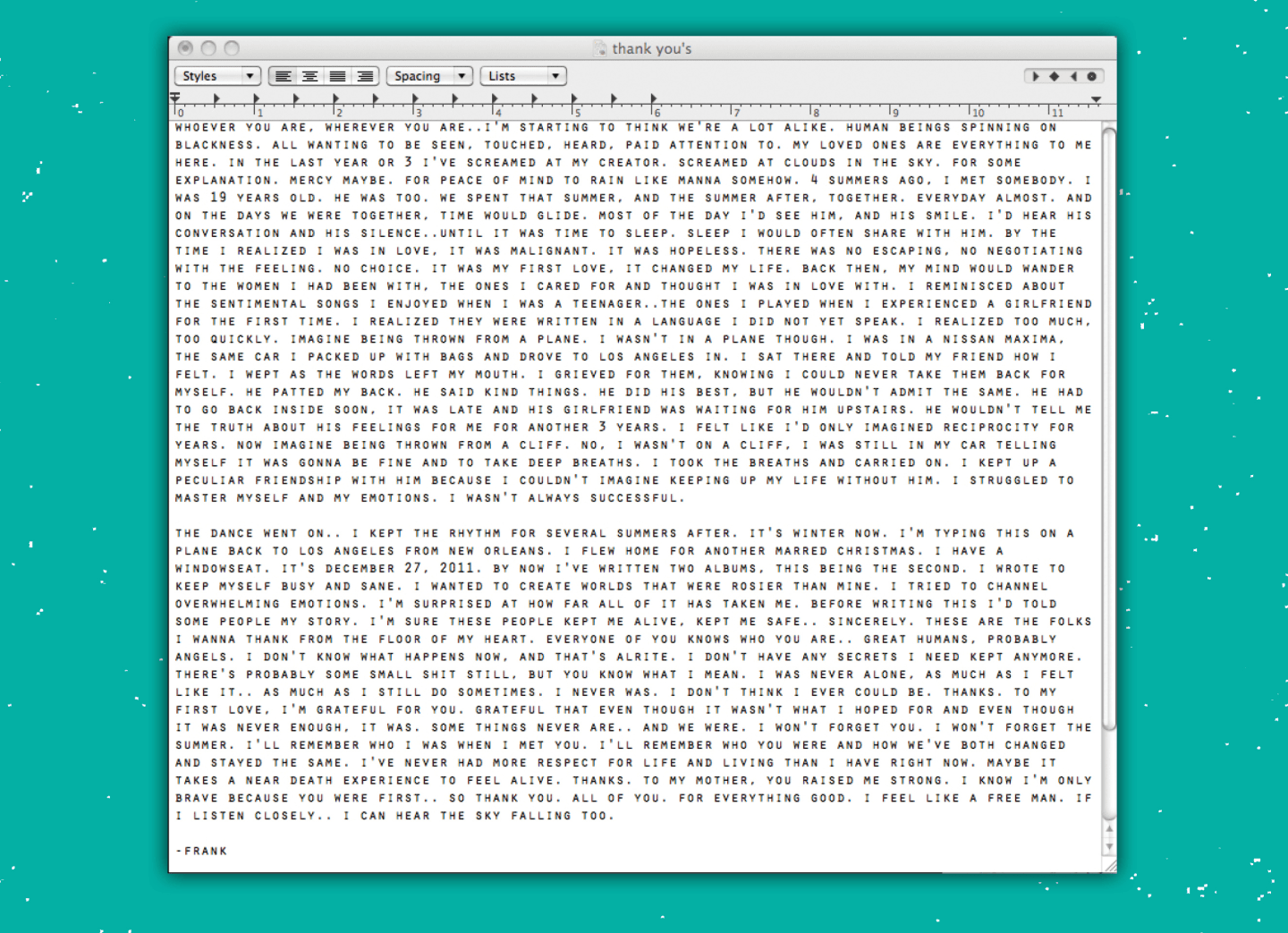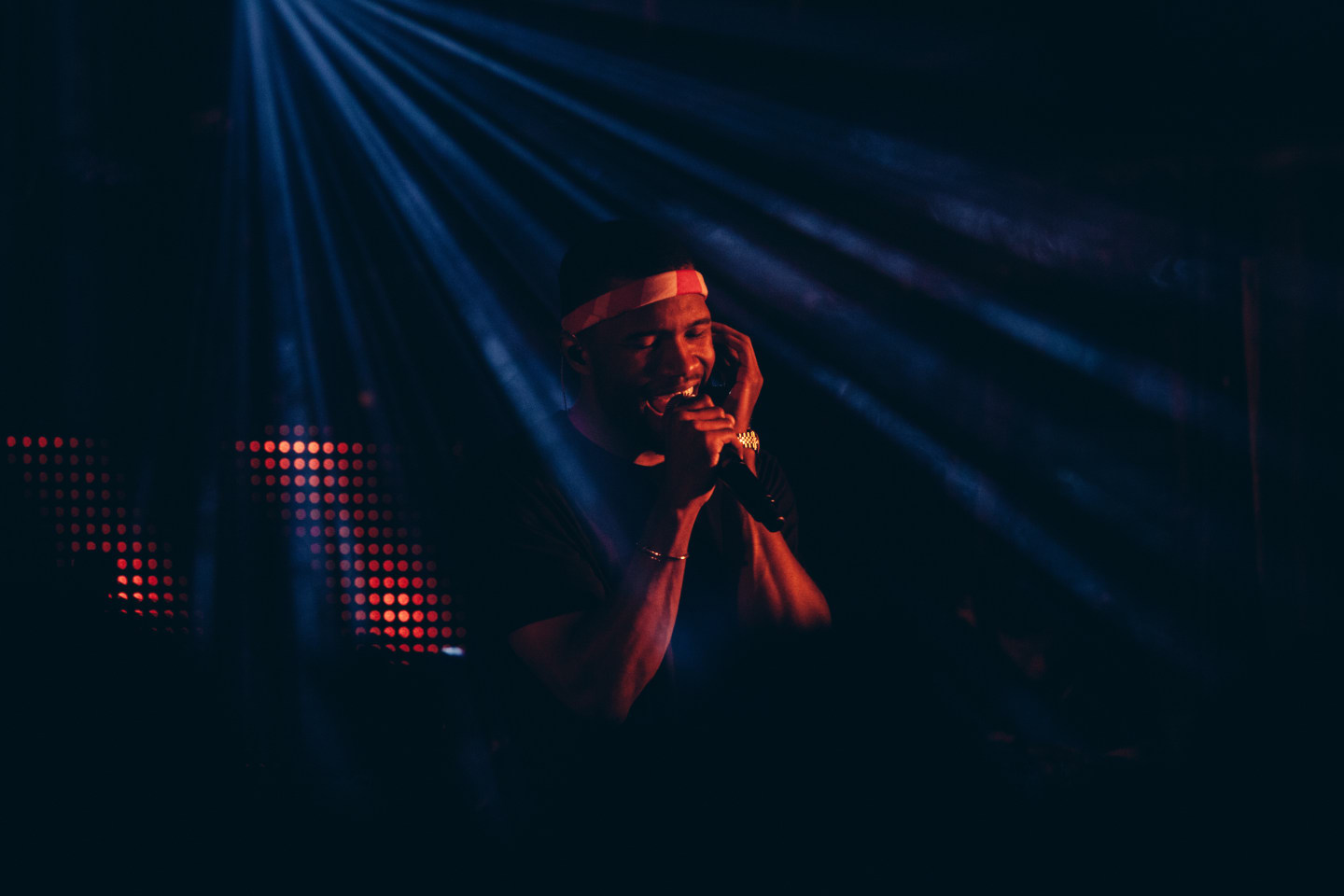 Frank Ocean
/
frankocean.tumblr.com
Frank Ocean
/
frankocean.tumblr.com
I was in bed with a stranger when I first saw a tweet about Frank Ocean’s now infamous 2012 Tumblr post—the one in which the singer revealed that his debut album, Channel Orange, was, in part, about a boy. It was the middle of the night, and I turned over to check my phone. The boy I was with, who I’d picked up at a terrible gay club on the west side of Manhattan and who I never saw again, didn’t know who Frank Ocean was and wasn’t terribly excited by this information. So I smiled privately. This is often how life happens now: on your phone, in bed, at 2AM, excitingly alone with the glow of the screen as the world around you changes.
Most celebrities collaborate with old media for their big reveals. Ellen Degeneres, America’s most famous gay person, came out on her network television show, acting out a scripted screenplay in which she told Oprah her truth. Caitlyn Jenner, America’s most famous trans person, spoke with Diane Sawyer and Vanity Fair to explain her identity. Not Ocean. He uploaded a shitty-looking screengrab of a TextEdit file—which, judging by the freeform cadence of the writing, hadn’t been edited by anyone else. He owned his story in one fell swoop, telling us exactly what he wanted and absolutely nothing more.
My own coming-out experience as a gay man unfurled in a string of sloppy conversations, tears, and stunted truths—a mess that I still have not, more than ten years later, fully cleaned up. So I suppose I envy Ocean. I’m sure that his own coming out was way more complicated than any single Tumblr post could suggest, but at least on that day in July, he ripped his fears off like a Band-Aid. “I’ve never had more respect for life and living than I have right now,” he wrote confidently. “I feel like a free man.”
 Frank Ocean in 2012
Geordie Wood
Frank Ocean in 2012
Geordie Wood
Ocean’s post symbolizes the entire potential of the internet in a single moment.
After his one post, Ocean didn’t talk much about his revelation. The closest we’d ever get to an inside look at his private life was an Instagram photo posted later that year of him and the beautiful male model Willy Cartier in some kind of shared yoga pose, which was interpreted as proof that the two were a couple. In truth, Ocean has never officially come out. As he said in the open letter, he’s also had relationships with women. Later, he told GQ in a 2013 interview—the only one in which he has addressed his sexuality outright—that he’s not keen to be hemmed in by sexual preferences. His phrasing, which did not commit to the strict confines of gayness, was read by some as wishy-washy cowardice, but I like to think of it as a landmark moment for anyone who has a blurrier, more fluid vision of their own identity.
And I see evidence of his influence everywhere. It’s there in Jaden and Willow Smith’s self-help proselytizing and gender-bending; in Amandla Stenberg’s video about the cultural appropriation of black hair, which she uploaded directly to YouTube; in DeRay Mckesson’s ability to insert himself into the mainstream media by tweeting about #blacklivesmatter issues; in Kehlani’s same-sex love songs. The seeds of Ocean’s bohemian, enlightened aesthetic are flowering beautifully in young, woke, politically minded artists across the spectrum.
For me, Ocean’s post symbolizes the entire potential of the internet in a single moment: a self-published, identity-forging, community-building piece of content. He could not have set a better precedent for regular young kids sharing their lives online—gay, straight, bi, trans, questioning, whatever. “As a writer, as a creator, I’m giving you my experiences,” he told GQ in that same interview, sounding every bit the modern, blissful hippie. “You can’t feel a box. You can’t feel a label. Don’t get caught up in that shit. There’s so much something in life. Don’t get caught up in the nothing. That shit is nothing, you know? It’s nothing. Vanish the fear.” And vanish it has, in countless ways in which the world feels more open. There are about 90,000 notes on that original Tumblr post, which seems so small in retrospect. No amount of reblogs or likes could count how big it has always felt.
